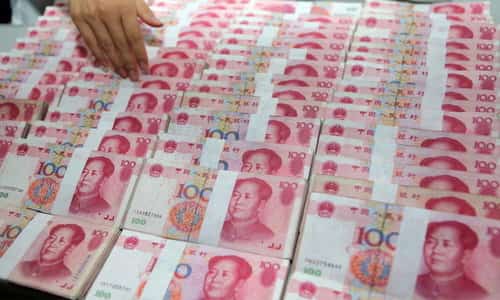New China Banking Crisis Could Rock Global Financial System
 By Michael Snyder,/Economic Collapse Blog September 20, 2016
By Michael Snyder,/Economic Collapse Blog September 20, 2016
Share this article:
The pinnacle of the global financial system is warning that
conditions are right for a "full-blown banking crisis" in China. Since
the last financial crisis, there has been a credit boom in China that is
really unprecedented in world history. At this point the total value
of all outstanding loans in China has hit a grand total of more than 28
trillion dollars.
That is essentially equivalent to the commercial banking
systems of the United States and Japan combined. While it is true that
government debt is under control in China, corporate debt is now 171
percent of GDP, and it is only a matter of time before that debt bubble
horribly bursts.
The situation in China has already grown so dire that the Bank for International Settlements is sounding the alarm...
A
key gauge of credit vulnerability is now three times over the danger
threshold and has continued to deteriorate, despite pledges by Chinese
premier Li Keqiang to wean the economy off debt-driven growth before it
is too late.
The Bank for International
Settlements warned in its quarterly report that China's "credit to GDP
gap" has reached 30.1, the highest to date and in a different league
altogether from any other major country tracked by the institution. It
is also significantly higher than the scores in East Asia's speculative
boom on 1997 or in the US subprime bubble before the Lehman crisis.
Studies
of earlier banking crises around the world over the last sixty years
suggest that any score above ten requires careful monitoring.
If
you are not familiar with the Bank for International Settlements, just
think of it as the capstone of the worldwide financial pyramid. It
wields enormous global power, and yet it is accountable to nobody.
The
following is a summary of how the Bank for International Settlements
works that comes from one of my previous articles entitled "Who Controls
The Money? An Unelected, Unaccountable Central Bank Of The World
Secretly Does"...
An immensely powerful
international organization that most people have never even heard of
secretly controls the money supply of the entire globe. It is called
the Bank for International Settlements, and it is the central bank of
central banks. It is located in Basel, Switzerland, but it also has
branches in Hong Kong and Mexico City. It is essentially an unelected,
unaccountable central bank of the world that has complete immunity from
taxation and from national laws. Even Wikipedia admits that "it is not
accountable to any single national government."
The
Bank for International Settlements was used to launder money for the
Nazis during World War II, but these days the main purpose of the BIS is
to guide and direct the centrally-planned global financial system.
Today, 58 global central banks belong to the BIS, and it has far more
power over how the U.S. economy (or any other economy for that matter)
will perform over the course of the next year than any politician does.
Every
two months, the central bankers of the world gather in Basel for
another "Global Economy Meeting". During those meetings, decisions are
made which affect every man, woman and child on the planet, and yet none
of us have any say in what goes on. The Bank for International
Settlements is an organization that was founded by the global elite and
it operates for the benefit of the global elite, and it is intended to
be one of the key cornerstones of the emerging one world economic
system.
Normally the Bank for International
Settlements is not prone to making extremely bold pronouncements, and so
this warning about China seems a bit out of character.
Is something going on behind the scenes that we don't know about?
Without a doubt, the global financial
system is shakier and more vulnerable than most people would dare to
imagine. Global central banks have been on the greatest money creation
spree in recorded history, and interest rates have been pushed to
ridiculously low levels.
If you can believe it,
approximately 10 trillion dollars worth of bonds are trading at
negative interest rates right now. This is completely and utterly
irrational, and when this giant bond bubble finally explodes it is going
to create a crisis unlike anything the world has ever seen before.
Just recently, Michael Pento of Pento Portfolio Strategies commented on this bubble...
He
said the current financial conditions are "the most dangerous markets i
have ever witnessed in my entire life - and i've been investing for
over 25 years... The membrane has been stretched so wide and so tight
that its about to burst."
Pento believes that
once the bond crash happens, it will trigger a cataclysmic wave of
crashes throughout the entire global financial system...
Mr
Pento has now warned that when policymakers signal they are set to stop
buying, which will stop bond prices rising, there is going to be a
devastating crash - not just in bond markets but across all investment
assets.
He said: "When the bond market breaks,
when that bubble bursts, it will wipe out every asset, everything will
collapse together... I mean diamonds, sports cars, mutual funds,
municipal bonds, fixed income, reits, collateralised loan obligations,
stocks, bonds - even commodities - will collapse in tandem along with
the bond bubble burst."
Many had been
anticipating that we would have already seen a major financial crash in
2016, but so far things have been pretty stable, and this has lulled
many into a false sense of complacency.
But it
is important to remember that we have seen corporate earnings fall for
five quarters in a row, and it is expected to be six when the final
numbers for the third quarter come in.
Never
before in history have we had a stretch like this without major economic
and financial consequences. The following comes from a recent Fortune
article which referred to an earlier piece authored by Jim Bianco...
None
of this, however, is apparent from how stock market indexes have been
moving lately, which unlike the charts above have been going up and to
the right. "Since 1947, every time profits fell this much, or for this
long, a recession was either underway or about to begin," writes Bianco.
"The only exception was the middle of 1986 to early 1987."
If
you remember, there was a pretty important event that happened in 1987:
A massive stock market crash that sapped close to 30% of the S&P
500's value in just five days.
It is only a matter of time before this earnings recession takes a major bite out of Wall Street.
Stock prices can stay at irrationally high levels for quite a while, but history has shown that every bubble bursts eventually.
And when this bubble bursts, it is going to make 2008 look like a walk in the park.


No comments:
Post a Comment